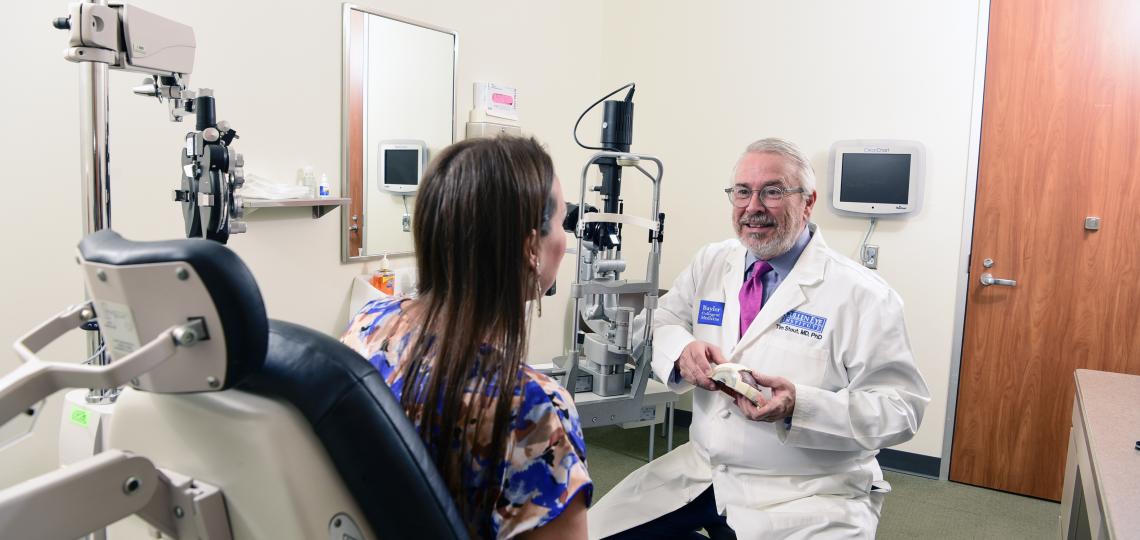Andalusia Optometrist: Committed Vision Care for Every Patient
Andalusia Optometrist: Committed Vision Care for Every Patient
Blog Article
Is Refractive Surgical Treatment Right for You? Variables to Think About for Better Eyecare
In the realm of eye treatment, the decision to undertake refractive surgery is a weighty one that demands thoughtful factor to consider. From the intricacies of one's eye wellness to the details of individual expectations and daily behaviors, each facet holds value in the broader landscape of refractive surgical procedure candidacy.
Eye Health Evaluation
When thinking about refractive surgical procedure, a comprehensive eye health analysis is essential to assess the suitability of the treatment for each and every person. eye center andalusia. This assessment entails a collection of tests and evaluations performed by an eye care professional to determine the overall health and wellness of the eyes, the visibility of any type of underlying conditions, and the security of the refractive error
During the examination, various elements are taken into consideration, such as the person's case history, existing eye prescription, corneal density, student dimension, and tear movie quality. These evaluations aid to determine any type of contraindications to refractive surgical treatment, such as corneal irregularities, cataracts, or without treatment eye infections. Additionally, the analysis aids to handle individual expectations pertaining to the prospective results of the surgical procedure based on their one-of-a-kind eye features.
Eventually, the eye health evaluation is crucial in making certain the safety and efficiency of refractive surgery, as it supplies important insights right into the person's eye wellness condition and assists determine the most suitable therapy choices for attaining optimum visual results. (cardiologist andalusia)
Lifestyle Evaluation
An extensive way of living analysis is integral in figuring out the suitability of refractive surgery for a person's visual correction requirements. Way of living factors such as occupation, pastimes, and everyday activities play a critical function in the decision-making procedure relating to refractive surgery. For example, people with careers that include a high degree of physical task or exposure to ecological aspects might have various visual requirements compared to those with less active desk work. Understanding just how a person's way of life may impact their vision post-surgery is crucial for handling expectations and making sure ideal end results.
In addition, lifestyle behaviors such as sports involvement, outdoor tasks, and even skincare routines can affect the recovery process and general success of refractive surgery. As an example, people that participate in contact sports might require to take additional precautions to secure their eyes during the healing duration. In addition, individuals with comprehensive sunlight direct exposure might require extra post-operative like avoid complications. By carrying out a thorough way of living assessment, eye treatment professionals can tailor their recommendations and treatment plans to satisfy the special requirements of each person, ultimately resulting in boosted visual outcomes and fulfillment.
Expectation Positioning

People require to understand that while numerous individuals achieve 20/20 vision or much better adhering to refractive surgical treatment, some might still require glasses for particular tasks like analysis or driving at evening. Managing these expectations helps prevent frustration and discontentment post-surgery, leading to a more positive overall experience for the person.
Danger Analysis

Aspects that might increase the danger of difficulties consist of age, right here particular medical problems like autoimmune illness, unpredictable vision prescription, thin corneas, and unrealistic individual assumptions. Furthermore, picking a proficient and skilled surgeon, complying with pre and post-operative treatment directions vigilantly, and disclosing any kind of appropriate medical background can assist reduce dangers.
To minimize the probability of difficulties, eye doctors perform thorough pre-operative evaluations to recognize any contraindications to surgical procedure. They likewise talk about the potential threats and advantages with people during the appointment process. By participating in open interaction and shared decision-making, both the person and the eye doctor can work with each other to figure out if refractive surgical procedure is the ideal selection based on private danger profiles and desired outcomes.
Examination Relevance
Thinking about the essential duty of notified decision-making in evaluating dangers and possible complications in refractive surgery, the consultation procedure holds substantial relevance in assisting individuals towards ideal results. Throughout the examination, the ophthalmologist evaluates the person's eye health and wellness, refractive mistakes, and general viability for surgery. This initial analysis is critical in identifying one of navigate to this website the most appropriate procedure for each and every individual, taking into consideration factors such as corneal density, student size, and existing eye problems.
In addition, the appointment functions as a chance for clients to discuss their expectations, worries, and any kind of inquiries they may have relating to the surgical procedure. Clear communication between the cosmetic surgeon and the individual is necessary to guarantee sensible assumptions and a comprehensive understanding of the possible dangers and benefits involved.
In addition, the assessment permits try here the cosmetic surgeon to clarify the various surgical options offered, their corresponding results, and the post-operative treatment needed. This thorough conversation encourages individuals to make educated decisions about their eye treatment, bring about far better contentment and results post-surgery.
Final Thought
In conclusion, people thinking about refractive surgical treatment must go through an extensive eye health and wellness analysis, evaluate their lifestyle practices, align their expectations with prospective results, evaluate the connected risks, and prioritize appointments with eye care specialists. These factors play an essential duty in figuring out the suitability of refractive surgery for every person, ensuring optimal outcomes and contentment with the procedure.
Individuals taking into consideration refractive surgical procedure typically have high expectations concerning the results, expecting best vision without the need for glasses or call lenses. While refractive surgical procedure can greatly improve vision and decrease dependence on aesthetic help, it is important for people to recognize that outcomes may differ based on specific variables such as the degree of refractive mistake, corneal density, and general eye health.
By engaging in open communication and shared decision-making, both the patient and the ophthalmologist can work together to establish if refractive surgical treatment is the best selection based on private risk accounts and wanted results.
Thinking about the essential function of educated decision-making in analyzing risks and potential problems in refractive surgery, the assessment procedure holds substantial relevance in leading patients towards optimal outcomes. During the assessment, the eye doctor examines the patient's eye wellness, refractive mistakes, and general suitability for surgery.
Report this page